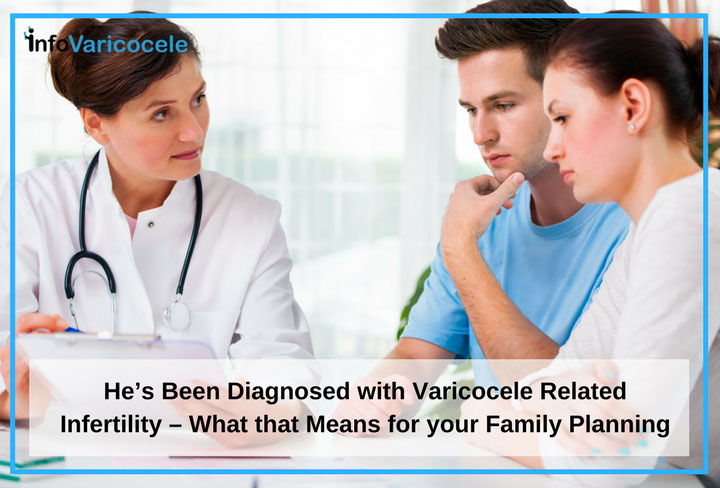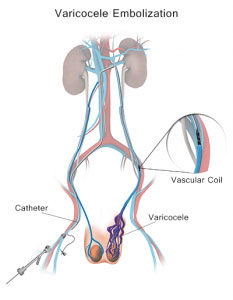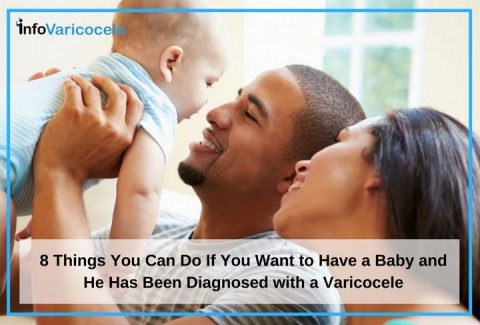
You have met the right person and now you’re both ready to have a baby. But you’ve been trying to become pregnant and it hasn’t happened yet. Does this sound like your situation?
If you and your partner have had unprotected intercourse for 12 months and are not pregnant, you’re experiencing what’s known as infertility. If a doctor has already determined that varicoceles are the cause of your partner’s infertility you’re probably wondering how this diagnosis will impact the future of your family.
While you both may be initially frustrated by the situation, it’s normal to wonder what you should do next. You don’t have to give up on your dream of having a family because there are varicocele treatments available that may help.
If you’ve just found out that your partner has varicocele related infertility, it still might be possible to have a family.
It’s important to keep in mind that varicoceles are common – in fact, this condition affects about 15% of men in the general population.[i] A varicocele is a collection of dilated blood vessels in the scrotum and around the testicles, most often on the left side. The exact causes of varicoceles are not completely understood. Experts believe varicoceles are caused by problems with the valves inside the veins and also the connection where veins join. A back up of blood at these two points increases the pressure in the veins, causing them to dilate.
While there are some risk factors for developing varicoceles, such as heavy lifting, often the condition cannot be prevented.[ii] Common signs and symptoms of varicoceles include:
- Dilated veins under the skin of the scrotum
- Discomfort, pressure or even pain in the scrotum or groin
- Feeling a bulge on one side of the scrotum
- Testicular atrophy, where one testicle may be smaller than the other
It’s possible that your partner may not have known that he has a varicocele. For some men, the only reason their varicocele is discovered is as a result of an infertility evaluation. Varicoceles are present in 35% of men with primary infertility.[iii] Varicoceles can affect fertility in several ways, including:
- Increased Temperature – Blood pooling inside or around the testicle increases temperature which can decrease testicular function.
- DNA Damage – Men with a varicocele have sperm with more DNA damage, making them less likely to successfully fertilize an egg.[iv]
- Low Testosterone – The testicles are responsible for the production of the male hormone testosterone and this can be diminished with a varicocele.
RELATED: 30 Stats About Varicocele Infertility That You Did Not Know
Treatments for Varicocele Related Infertility
The most important thing for you and your partner to learn is that there are effective treatments for varicoceles. The benefits of treating varicoceles may include:
- Improved sperm count
- Improved sperm quality
- Possible relief of discomfort and pain
- Normal testosterone levels
- Testicle returns to normal size
The next step is to understand which treatment is right for your partner. There are surgical options as well as an effective, minimally invasive option for the treatment of varicoceles. Both treatment options involve locating the veins that are flowing into the varicocele and closing off the blood flow to direct the pressure away from the varicocele.
Varicocele Surgery
To learn about varicocele surgery, you will need to find a surgeon who specializes in varicocele surgery. The surgeon, typically a urologist, makes an incision in the skin, locates the veins and ties them off. The incision may be in the groin, as in the open and microsurgical approaches, or there may be several small incisions made in the abdomen, as is used in the laparoscopic approach. Each approach has its own risks and chances of success.
If considering varicocele surgery, your doctor can help determine which surgical option may be best for your partner.
Varicocele Embolization
 Surgery is not the only effective option to consider for varicoceles treatment. If your partner would like to avoid surgery, talk with him about varicocele embolization. This minimally invasive treatment for varicoceles is performed by an interventional radiologist as an outpatient procedure. Varicocele embolization begins with a small nick in the groin and a catheter, or a small tube, is inserted into the femoral vein. Using x-ray guidance, the catheter is threaded from the femoral vein into the veins that feed into the varicocele. The affected veins are closed off with a small coil and sometimes a scarring chemical. Swelling and pressure within the testicle will be reduced if the blood flow is successfully diverted towards healthy veins, away from the varicocele.
Surgery is not the only effective option to consider for varicoceles treatment. If your partner would like to avoid surgery, talk with him about varicocele embolization. This minimally invasive treatment for varicoceles is performed by an interventional radiologist as an outpatient procedure. Varicocele embolization begins with a small nick in the groin and a catheter, or a small tube, is inserted into the femoral vein. Using x-ray guidance, the catheter is threaded from the femoral vein into the veins that feed into the varicocele. The affected veins are closed off with a small coil and sometimes a scarring chemical. Swelling and pressure within the testicle will be reduced if the blood flow is successfully diverted towards healthy veins, away from the varicocele.
The opening in the skin is covered with a dressing and sutures are not needed. The varicocele embolization procedure is usually completed within one hour.
If varicocele embolization is a treatment option you and your partner wish to further explore, find an interventional radiologist, a doctor who specializes in minimally invasive image guided treatments and performs varicocele embolization to discuss this procedure in greater detail.
If varicoceles are the cause of your partner’s infertility, neither of you should feel hopeless about your dreams of having a family. If a physician has diagnosed your partner with varicoceles, scheduling an appointment with an interventional radiologist who specializes in varicocele embolization can help in his consideration of all treatment options before deciding on surgery. Together, you can consider all of the options and your goals as a couple to determine the best course of treatment.
Sources:
[i] Choi, W., and Kim, S., Current Issues in Varicocele Management: A Review. World J Mens Health, 2013. 31(1): p. 12-20. http://wjmh.org/DOIx.php?id=10.5534/wjmh.2013.31.1.12 (Accessed 8/1/2016)
[ii] Gokce, A., et al., Association of left varicocele with height, body mass index and sperm counts in infertile men. Andrology, 2013. 1: p. 116-119. http://www.ncbi.nlm.nih.gov/pubmed/23258639 (accessed 8/11/2016)
[iii] Kovac, J. R., et al. (2014). Cost-effectiveness analysis reveals microsurgical varicocele repair is superior to percutaneous embolization in the treatment of male infertility. Can Urol Assoc J, 8(9-10), E619-25. Retrieved from http://www.ncbi.nlm.nih.gov/pubmed/25295133 (accessed 12/14/2016)
[iv] Wang., Y.J., et al., Relationship between varicocele and sperm DNA damage and the effect of varicocele repair. Reprod Biomed Online, 2012. 25(3):p. 307-314. Accessible at http://www.ncbi.nlm.nih.gov/pubmed/22809864 (Accessed 8/11/2016)


